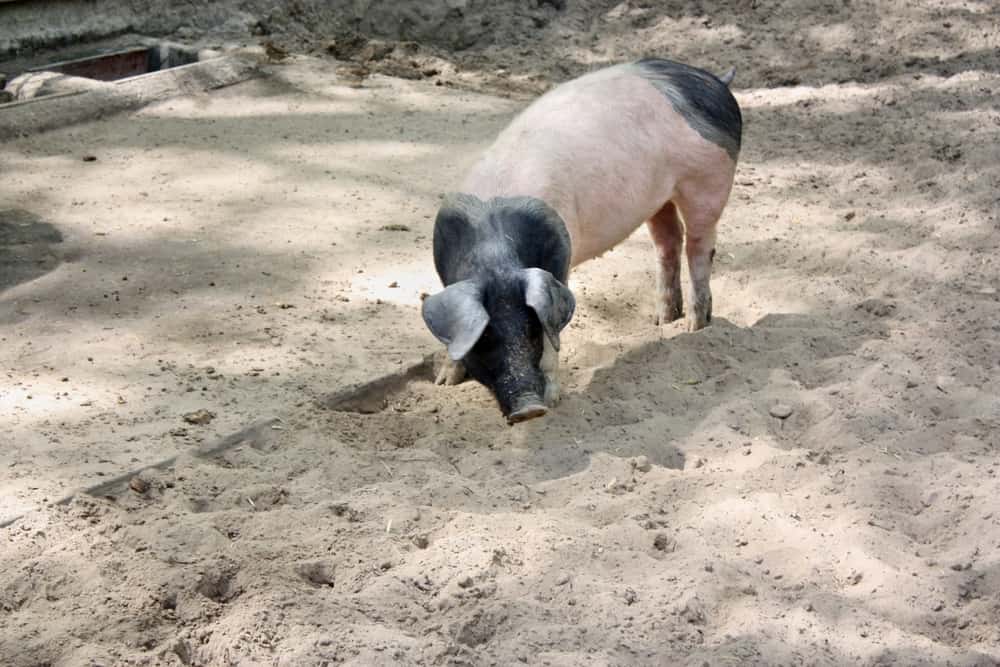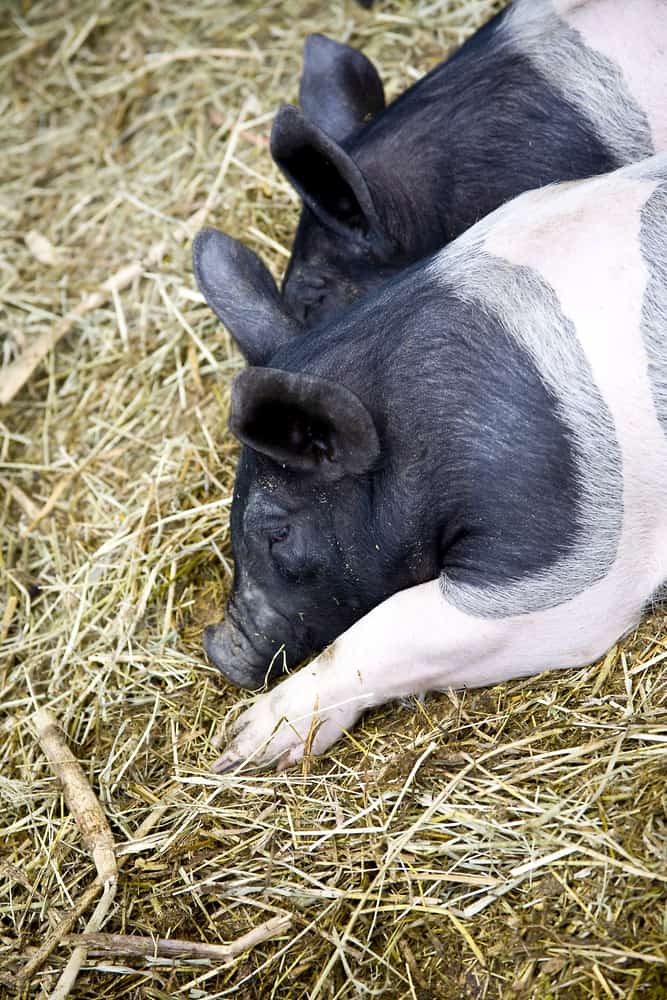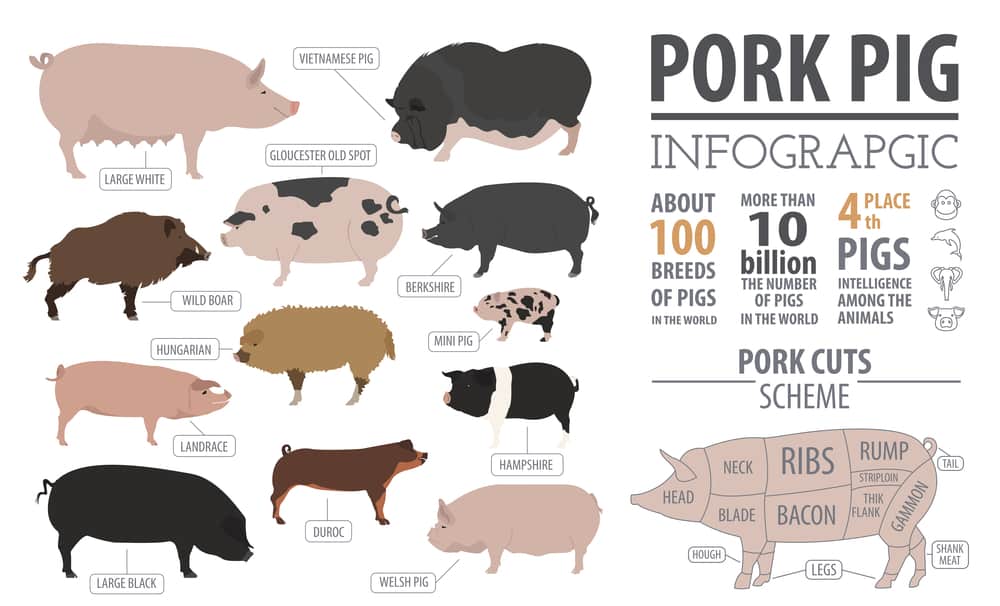
Hampshire pigs are easy to breed and produce excellent, lean meat. They are good breeders and naturally intelligent creatures.
Should I choose Hampshire pigs?
There are a lot of pig breeds to choose from. If you’re looking for leaner meat, then Hampshire pigs are an excellent choice.
A lot of pigs have naturally fatty meat, so a lean alternative is sometimes rare to find. They are also friendly, docile, and easy to rear.
Female pigs, or sows, produce healthy piglets and there are very few issues with birthing, nursing, or weaning.
If you are looking for an all-around easy to care for a pig, Hampshire pigs should be a definite consideration.
Hampshire Pig Origin and History
Hampshire pigs get their name from the place in the United Kingdom the were discovered.
They were bred from areas around Northern England and Scotland in the 18th and 19th centuries.
Local residents actually named this breed Hampshire hogs.
Around the 1830s, the Hampshire breed was brought to the United States where it subsequently flourished.
While the Hampshire line of pigs was maintained once they were brought to the United States, the remaining pigs have since altered.
They are now known as Wessex Saddleback pigs and their main difference between the original breed are their floppy ears and preference for forest foraging rather than being farm animals.
What are the characteristics of a Hampshire pig?

Size
While they might seem large to the average person, Hampshire pigs are actually classified as a medium-sized breed.
Weight
Hampshire pigs can become quite large. Boars can top the scales at 650 pounds while sows can get up to 550 pounds.
Their weight can actually be a bit of an issue. Instead of caring for such large pigs, many farmers choose to slaughter boards by the 250-pound range to ensure leaner meat.
Color
Hampshire pigs have very distinct coloring. While their bodies are almost all black, a white belt exists around their middle that covers their front legs and down to their hooves.
If you see a Hampshire pig that is white or ginger in color, it often means it has been crossbred.
Physical Characteristics
One very unique characteristic of this breed is their erect ears. While other pigs have floppier ears, Hampshire pigs have black ears that stick straight up.
While Hampshire pigs have medium-sized heads, their eyes are quite small. As a result, their vision can be quite limited.
As for tails, expect short, curly tails with Hampshire pigs.
Behavior
It can always be a bit surprising how intelligent pigs are, and Hampshire pigs are no exception.
You can expect compassionate, sometimes emotional responses from this breed.
Don’t be surprised if a Hampshire pig comes over to you to try to comfort you.
If you’re having a bad day, they can actually sense this and try to offer a few nudges or snorts to show they are aware.
Because of their emotional aptitude, you will want to treat these pigs with respect. While they may not complain while being mistreated, they will remember it.
Give your Hampshire pigs enough space, access to clean water, and quality, nutritious food. In exchange, they will treat you with respect.
Temperament
There’s a reason why Hampshire pigs are so popular and it’s usually because of their temperament.
For the most part, these pigs are good-tempered and have an even disposition.
They won’t attack if unprovoked and are generally docile creatures. The only exception to this are adult boars who can become aggressive as they reach an older age.
**Looking for an alternative choice for a pig? Check out Yorkshire Pigs and why are excellent farm animals!**
How long do Hampshire pigs live?
The lifespan of Hampshire pigs is 12 years. However, many pigs, especially boars, are slaughtered earlier for meat purposes.
Breeding
Hampshire pigs are excellent breeders. Sows are natural mothers and the phrase, “longevity in the sow” is often referred to like this breed.
You can expect larger than average litter sizes, of 7 to 15 piglets. While piglets reach their sexual maturity by 7 months of age, they are not bred until around 1 year of age.
Below is a short video of a Hampshire pig feeding her newborns:
One other interesting fact about Hampshire pigs is that they have often crossbred with other breeds thanks to their lean meat.
Feeding
The diet of a Hampshire pig should primarily be grains and vegetables.
You should also provide a vitamin supplement to ensure they have all the nutrients necessary.
A benefit of any kind of pig is that they will eat just about anything you give them, including kitchen scraps.
This is incredibly helpful given how large Hampshire pigs get and therefore how much they need to eat to attain that weight.
In addition to food, don’t forget the water! This swine breed needs plenty of water – up to 14 gallons.
Remember to give your pigs fresh water daily. Also, make sure the water trough is low enough to the ground as Hampshire pigs can have shorter legs.
Meat Quality

This breed of pig is the fourth most recorded breed for a reason. Their taste!
Hampshire pigs are known for their lean meat and good carcass quality. The meat is well-textured thanks to the high muscle content.
Their back meat is especially low in fat and makes a nice alternative to more common, fattier pork.
Other carcass qualities include thin skin and thin rinds.
Related Content:
HAMPSHIRE PIGS FAQ
What is the Hampshire pig used for?
Hampshire pigs are built quite muscular and as a result, their meat is of good quality to eat.
They are fairly easy to breed, thanks to the female pigs, or sows. There are no major issues when it comes to birthing or nursing piglets.
Hampshire pigs are also used to breed with other types of pigs.
Their lean meat is well sought-after, and many breeders try to introduce this characteristic into other, fattier breeds of pigs.
How big do Hampshire pigs get?
Hampshire pigs are considered a medium-sized pig. Male pigs can reach up to 650 pounds and female pigs can reach 500 pounds.
Conclusion
Hampshire pigs are easy to take care of. Their docile, intelligent manor makes them suitable for farms of all sizes, and their lean meat is delicious.
Related Content:
- Berkshire pigs, why should you choose them?
- Duroc Pigs, find out why they’ve always benefited farmers!

